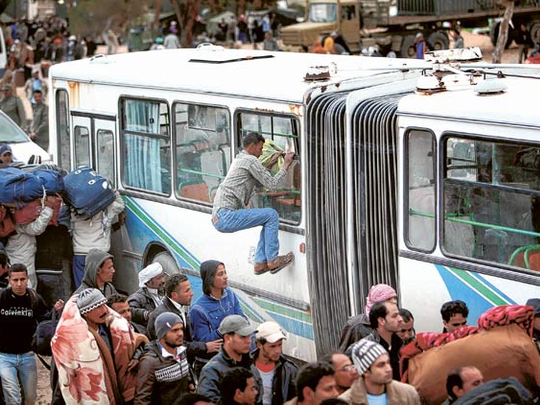
Benghazi: For all the rowdy anti-government protests and people saying they're ready for martyrdom, the fear that Muammar Gaddafi has sown for 41 years doesn't disappear in the few seconds it takes to fire off a round of celebratory gunfire.
That lingering dread is most obvious in Gaddafi-controlled cities in western Libya, where news is scarce because people are reluctant to talk on the phone, lest his security is listening.
But even in Benghazi, an eastern city free of militia and mercenary forces, a man giving interviews at the courthouse refused to give his real name, saying there were still pro-Gaddafi supporters and spies in the city.
Here, people are stuck between the euphoria of a revolution and the tension over what price they may pay if it doesn't succeed - and even if it does.
One minute they insist that fear went away on February 17, when the protests began. But wait a bit, and the worry comes out. And when they see Gaddafi on TV giving another one of his erratic speeches, they say: He's not going anywhere.
"As long as he is sitting, there will be fear," said Fathiya Saleh, 49. "When you see him on TV you feel he is going to attack us at any moment."
Many here still remember how Gaddafi used to execute those who opposed him — or those he felt had opposed him — and would leave their bodies hanging from nooses for days as a warning.
Or how in the 1980s he executed people at dusk in Ramadan while Libyans were breaking their fast, an act that for many went beyond just taking lives. Hamida Musah hasn't left her house since the protests began. Her mother lives next door, but she doesn't dare visit her.
Killings
"On the foreign news channels, they say there is killing," she said. "On the Libyan [state] channels ... people call in from all over and say, ‘Everything is good here in Tripoli,' ‘Everything is good in Benghazi.' I watch it to be calm. To be honest, we're sitting in fear."
But it can perhaps be felt most distinctly in Ajdabiya, a city about 90 miles south of Benghazi and near the area under Gaddafi's control. There, people have a nervous feeling of being on the front of liberated eastern Libya.
"The people are afraid from the armed response," said Faraj Abu Rijaa, a sports reporter.
"Residents are too close to Gaddafi's stronghold of Surt to feel that their city is completely free. Armed with guns from Ajdabiya's small, deserted military base, volunteers and soldiers who have defected man two checkpoints on either edge of the city.
"The news is scary," said Abdul Hamid Musbah, Ali's cousin and an assistant producer for a TV station in Benghazi, watching the Al Arabiya news channel. "The people are afraid that he will come with tanks and attack us."
In Abu Rijaa's living room on Friday, people gathered and talked about the possibility of an attack on their city. "We are 99 per cent sure he is done, and we are not afraid except for his military response," said Khalid Mohammad Bayda, a judge. Part of that fear is based at an armoury a few miles west.
On Tuesday, a fighter plane carrying a missile headed toward Ajdabiya, and residents believe the crew had been ordered to fire its weapon at the armoury, which they say could have levelled the city. Instead, the two pilots ejected and the plane crashed about 25 miles west of the city. The pilots are now in Benghazi and parts of the plane are positioned like a strange altar near one of the city's checkpoints, not far from the armoury.










